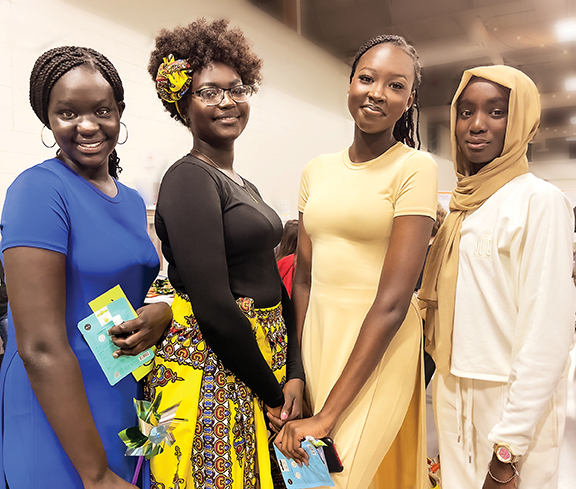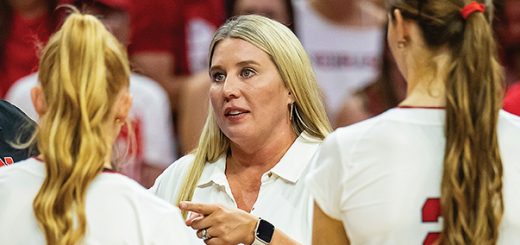Lincoln’s Culture Centers Celebrate Diversity

by Sriyani Tidball
Lincoln’s ethnic profile has changed significantly over the past few decades, becoming a vibrant mosaic of diverse communities, each with its own cultural centers. These centers not only provide essential support to our native ethnic groups, but also to the many immigrants and refugees who find a welcoming home here.
The recent growth in immigrant populations has had a profound impact on Lincoln’s neighborhoods. Refugees and immigrants are revitalizing urban areas by establishing businesses, sharing their cultures, and breathing new life into communities. Since the 1980s, Lincoln and Lancaster County have seen a steady increase in refugee populations. Many of the newer ethnic communities have formed their own cultural groups and often meet in a local church.
Asian and Latino stores, markets, and restaurants have injected new economic energy into once-neglected areas of Lincoln. These vibrant ethnic enclaves have made it easy for residents to enjoy a variety of international flavors, from a delicious falafel sandwich to some spicy curry or a refreshing bubble tea. And once-uncommon ethnic vegetables have become mainstream in our local supermarkets.
When it comes to dining, Lincoln offers a wealth of international cuisine. If you’re craving Indian food, you have a variety of sophisticated restaurants to choose from like the popular and local favorite, The Oven. For Thai food, there are four great options, with Blue Orchid downtown being a personal favorite. The city also boasts an array of Korean, Japanese, Vietnamese, Indian, African, Middle Eastern, and authentic Mexican restaurants.
The Lincoln Public Schools proudly represent over 30 different language groups at the elementary level. Beyond the classroom, residents have the opportunity, to learn Spanish at the Hispanic Community Center, Lakota at the Indian Center, and languages like Chinese, Japanese, and Russian at the University of Nebraska-Lincoln (UNL). It’s not uncommon to hear conversations in Iraqi, Vietnamese, French, or Sudanese as you walk through local department stores. UNL also plays a key role in enriching Lincoln’s international diversity, educating thousands of foreign students from various nations and further adding to the city’s vibrant cultural tapestry.
The University of Nebraska-Lincoln (UNL) is home to the state-of-the-art Jackie Gaughan Multicultural Center, which underscores the importance of diversity and culture in education. The center hosts numerous cross-cultural events throughout the year, open to both students and the Lincoln community. Conveniently located next to the Nebraska Student Union, the Gaughan Multicultural Center offers a variety of resources, including student lounges, a computer lab, meeting rooms, a large multi-use area, student offices, tutoring rooms, and dedicated spaces for faculty, staff, and students involved in multicultural programming. For more information about the center and upcoming events, visit unions.unl.edu/jgmc.
Many of Lincoln’s long-standing ethnic communities have established their own cultural centers that warmly embrace and share their unique traditions with others. These centers promote inclusivity by inviting everyone to experience and celebrate diverse cultures. Here are some of the most prominent community centers in the city.
The Asian Community and Cultural Center serves both Asian refugees and the established members of Lincoln’s rapidly growing Asian population. To support new refugees in becoming self-sufficient as they integrate into their new lives in Lincoln, the center offers the Fusion Project. This initiative collaborates with various refugee groups to help build an educated and culturally rich community for all of Lincoln’s residents.
The center also hosts a variety of programs that celebrate Asian cultures, including Chinese Tai Chi Chuan (martial arts) classes, the Japanese Aki-Matsuri Fall Festival, and the traditional Lion Dance Troupe. Most of the center’s volunteers are bilingual high school and college students who offer their time on a flexible schedule. For more information, visit www.lincolnasiancenter.org.
The Indian Center, Inc., established in 1969, serves Nebraska’s Native American community and other Lincoln residents by providing vital services in areas such as food assistance, housing, cultural enrichment, employment, and health. Known for its generosity, the center offers free lunches to anyone in need who walks through its doors. The Senior Center, open Monday through Friday from 8 a.m. to 2 p.m., features specialized programs for seniors.
The center is also dedicated to youth empowerment through initiatives like Indian child welfare, Native American Junior Achievement, and summer youth programs. It hosts various activities that include art exhibits and pow-wows. The center’s summer pow-wow, is a cherished Lincoln tradition.
The Indian Center uses volunteers in its employment and training programs to help locate job opportunities in the community for the unemployed. It also offers programs like the Work Investment Act (WIA and Lakota language classes. Since its founding, the Indian Center has become an integral part of Lincoln’s human services network, serving both Native Americans and non-Natives alike. For more information, visit indiancenterinc.org.
The Clyde Malone Community Center has a long-standing commitment to civil rights and improving the lives of African American residents in the Malone, Clinton, and Hartley neighborhoods and is now building a new, larger building expected to be finished in 2025. The center fosters unity and prosperity throughout Lincoln while honoring African American heritage. Many of Malone’s programs are dedicated to strengthening family bonds, offering childcare, and intervention programs for at-risk children, including reading and writing assistance for elementary students. Additionally, the center provides substance abuse programs for both elementary and secondary students, along with transportation to its after-school programs.
Each November, the center organizes its largest volunteer effort, reaching 1,700 families in Lincoln and Lancaster County with Thanksgiving baskets assembled by volunteers. For more information, visit www.malonecenter.org.
El Centro de las Américas, established in 1982, originally operated out of a parishioner’s home in Lincoln’s Spanish-speaking Catholic community. Today, the center provides a wide range of educational and cultural activities, serving thousands of visitors each year. Services include emergency assistance, food, clothing, employment support, empowerment programs, and educational opportunities. The center also offers a summer lunch program for children 18 and under, bilingual mental health outreach, substance abuse programs, candidate forums, and special tutoring and motivational programs for Hispanic high school students.
One of the city’s highlight events, the annual Hispanic Heritage Festival, takes place every September, celebrating the rich culture and contributions of the Hispanic community. The center is a welcoming place, especially for those whose first language is Spanish. For more information, visit www.elcentrodelasamericas.org.
The Yazidi Cultural Center (YCC), located at 300 N. 27th Street, is part of the larger national organization Yazda, which is dedicated to creating a supportive community for Yazidi refugees. Thanks to its presence, Lincoln is now home to the world’s largest Yazidi refugee community. The small team at YCC plays a crucial role in educating refugees about basic American rights and preparing them for citizenship. The center also offers English and Kurmanji (Northern Kurdish) language classes, helping refugees integrate into Lincoln while staying connected to their cultural roots. If you are looking for a way to be a part of Lincoln’s diversity, check out two of Lincoln’s cross-cultural organizations; the Cultural Centers of Lincoln Collaborative (culturalcentersoflincolncollaborative.com/) and the Good Neighbor Community Center (togetheronelincoln.org/good-neighbor-community-center/) that aims to build bridges that connect community through social services, public resources and cross-cultural relationships while providing culturally sensitive services.




Recent Comments